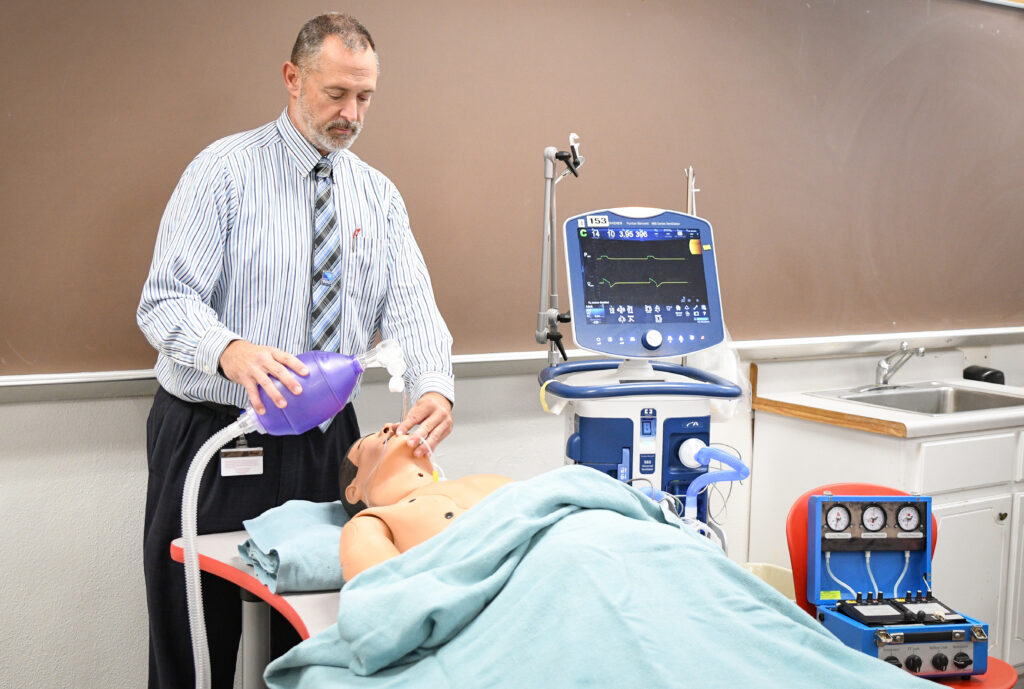
Story: Betsy Compton | Photo: Cody Ingram
Program anticipated to launch fall 2024
As a respiratory therapist and medical educator in Birmingham, Jerry King was keenly aware of Alabama’s lingering shortage of professionals trained to care for one of patients’ essential needs: the ability to breathe.
The good-natured joke among his colleagues, King said, is that respiratory therapists “handle anything from the nose to the diaphragm.” What isn’t as light-hearted is the meager number of respiratory therapists graduating from Alabama-based institutions each year; supply isn’t meeting demand. So King, the former interim director of the respiratory therapy program at the University of Alabama at Birmingham, decided to act.
His move essentially hand-delivered one of the state’s newest respiratory therapy programs to the University of West Alabama. The program has been accredited by the Alabama Commission on Higher Education, and the University is seeking final program accreditation from the Southern Association of Colleges and Schools Commission on Colleges and preliminary accreditation from the Commission on Accreditation for Respiratory Care, King said.
Once accreditation is in place, the university plans to admit its first cohort of students in the fall of 2024. Graduates will receive a bachelor of science degree in Health Sciences-Respiratory Therapy track.
King, now an associate professor at UWA, will be the program director and he is currently seeking another faculty member for the program.
“It was a challenge,” King said. “But I just knew I had help and support of people who said, ‘Absolutely, you can do it. Yes, it’s difficult, but it’s not unbearable. It’s not undoable.’”
Especially at UWA, where Dr. R.T. Floyd, chair of the School of Health Sciences and Human Performance, was immediately interested in hearing King’s pitch. New academic programs aren’t created overnight, but what started with an initial email to Dr. Mary Hanks, chair of the Division of Nursing, immediately led to discussions between King and Floyd and other UWA administrators, including University President Dr. Ken Tucker.
UWA’s health sciences major already featured five tracks — athletic training, physical therapy, occupational therapy, physician’s assistant, and a general track — with plans to consider future expansions with other concentrations, Floyd said. The respiratory therapy track, once fully accredited, will enlarge the major to six concentrations. Plans for other concentrations are underway.
As director of UWA’s athletic training and sports medicine program, Floyd didn’t need much convincing from King’s proposal.
“It’s a no-brainer, really, because there’s a huge demand,” he said. “COVID made that very obvious around the country.” Students will gain experience at clinical sites in west Alabama and east Mississippi, and their classwork will take place on campus at UWA.
A high priority is creating awareness — on and off campus — about the program, said Floyd, who envisions interest may come from current UWA students as well as those who enroll specifically because of the new track. Recruiting the first group of students anchors the process of building a new program from the ground up.
“Mr. King is confident that we can get them,” Floyd said. “He thinks we could easily get 30 students in a cohort.”
Though the addition of a respiratory therapy track to the UWA catalog isn’t directly related to the COVID-19 pandemic, King is adamant that the timing couldn’t be better — for the University and for the state’s healthcare providers.
The intense media coverage of front-line hospital workers during the pandemic often highlighted the efforts of respiratory therapists, whose training placed them at the front of COVID patient care. Before the pandemic, King said, their specialized skills weren’t as widely known — or valued by the public — as they are now. “In reality, unless you have a family member in the profession or have been around one, very few people knew what respiratory therapists did until COVID hit,” he said.
That’s not the case in 2023.
“(COVID) opened up new procedures and care that respiratory therapists are now providing, which is great, except we don’t have enough therapists to do what we need to do now,” King said. “Now we have all these added procedures we are expected to do. More patients saw respiratory therapists, and respiratory therapists were there at the bedside for a lot more procedures.”
Respiratory therapists’ “nose to the diaphragm” coverage enables them to assist with an expansive list of medical issues, King said. They treat pulmonary disorders in babies. They can insert artificial airways into patients’ throats. They manage mechanical ventilators and other life-support machines. They assist with disease management, smoking cessation, oxygen therapy and medication delivery. They’re involved in certain treatments for sleep apnea. It’s also common for respiratory therapists to assist patients diagnosed with bronchitis, emphysema, asthma or chronic obstructive pulmonary disease.
During a recent state-wide survey, King said there were nearly 200 vacant respiratory-therapist jobs in Alabama. Teaching students who will help reduce that shortage brings him joy.
“I’ve always called it the ‘ah-ha’ moment when you’ve got a student who doesn’t understand something and you’re able to explain it and they still don’t understand it, but you change the way you explain it and you see their eyes light up,” he said. “You can see when they grasp it. Hopefully, I can make a difference.”